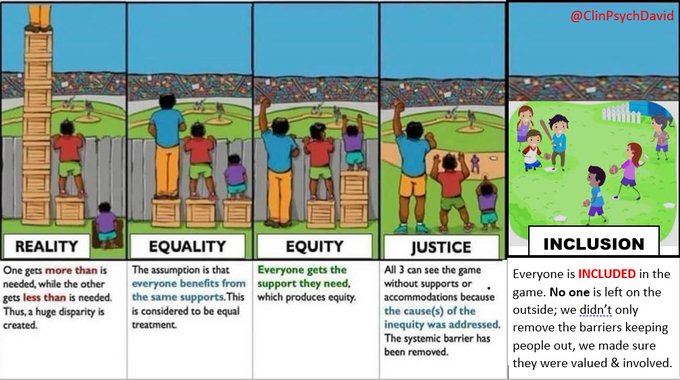In my advocacy work, my main focus is on identifying and trying to break down barriers.
Why?
Because conditions only become disabilities when those with conditions encounter barriers that they are unable to overcome.
In disability circles, there's a well known illustration of three persons at a baseball game.

In the version shown above, with five cells the first cell shows reality - that some people have advantages (money, connections, etc.) that may result in them being able to better enjoy watching the game, whereas others may even have disadvantages that further compound what they'd need to overcome the physical and metaphorical barrier that the fence poses.
The second and third cells show the difference between equality (often implemented by well-meaning persons, but which is actually ableist) and equity (which takes into actual needs, and is the focus of many programs and policies which address disabilities, and is often decried by those without access needs as being "unfair").
The fourth cell, labelled "justice" shows the standard desired model - where the fence is taken away. Now everyone can watch the game.
This particular illustration includes a fifth cell, labelled "inclusion" where those who wish to play (rather than to just watch) are also welcome to do so.
What I'm writing about here is a long topic on its own, but I just wanted to write about it here briefly because the biggest barrier for persons with disabilities, especially hidden and/or episodic disabilities, is attitudes.
People tend not to think of barriers unless their own life, or the life of someone close to them, is impacted by barriers. And even for those who face barriers, we can sometimes be conscious of those that impact us, and not necessarily those that impact those with other conditions.
And so something that I'd like to encourage everyone to do in the coming year, is to learn more about challenges faced by other persons, and to increase awareness (in whatever way you're comfortable with) of barriers and advocate for the removal of them. Remember that nothing is too little, and sometimes, just talking to someone may spark them to tell someone else, etc.
When we can break down and remove barriers, everyone wins.
Why?
Because conditions only become disabilities when those with conditions encounter barriers that they are unable to overcome.
In disability circles, there's a well known illustration of three persons at a baseball game.

In the version shown above, with five cells the first cell shows reality - that some people have advantages (money, connections, etc.) that may result in them being able to better enjoy watching the game, whereas others may even have disadvantages that further compound what they'd need to overcome the physical and metaphorical barrier that the fence poses.
The second and third cells show the difference between equality (often implemented by well-meaning persons, but which is actually ableist) and equity (which takes into actual needs, and is the focus of many programs and policies which address disabilities, and is often decried by those without access needs as being "unfair").
The fourth cell, labelled "justice" shows the standard desired model - where the fence is taken away. Now everyone can watch the game.
This particular illustration includes a fifth cell, labelled "inclusion" where those who wish to play (rather than to just watch) are also welcome to do so.
What I'm writing about here is a long topic on its own, but I just wanted to write about it here briefly because the biggest barrier for persons with disabilities, especially hidden and/or episodic disabilities, is attitudes.
People tend not to think of barriers unless their own life, or the life of someone close to them, is impacted by barriers. And even for those who face barriers, we can sometimes be conscious of those that impact us, and not necessarily those that impact those with other conditions.
And so something that I'd like to encourage everyone to do in the coming year, is to learn more about challenges faced by other persons, and to increase awareness (in whatever way you're comfortable with) of barriers and advocate for the removal of them. Remember that nothing is too little, and sometimes, just talking to someone may spark them to tell someone else, etc.
When we can break down and remove barriers, everyone wins.
